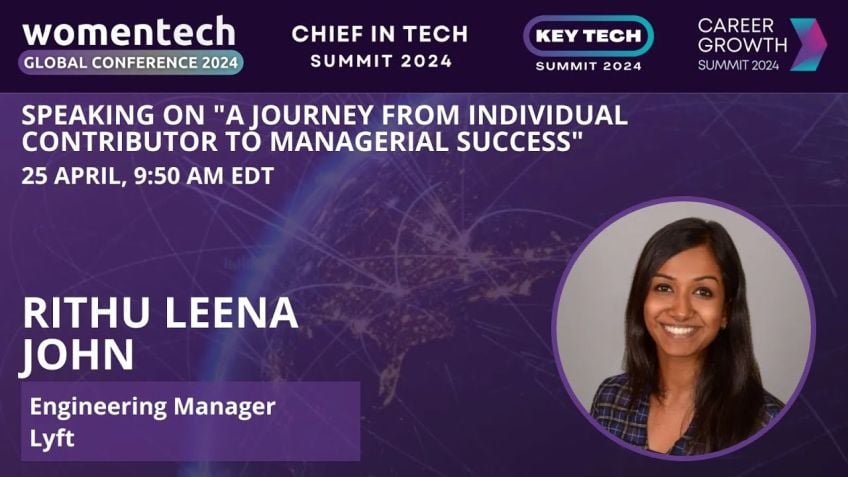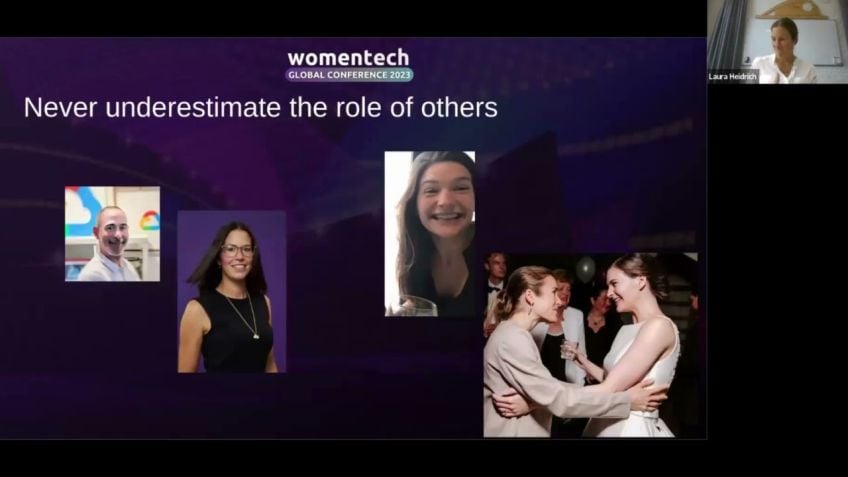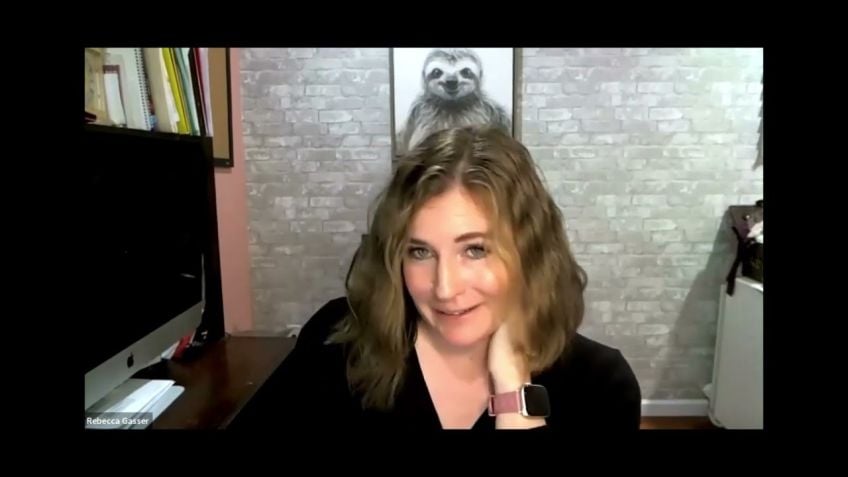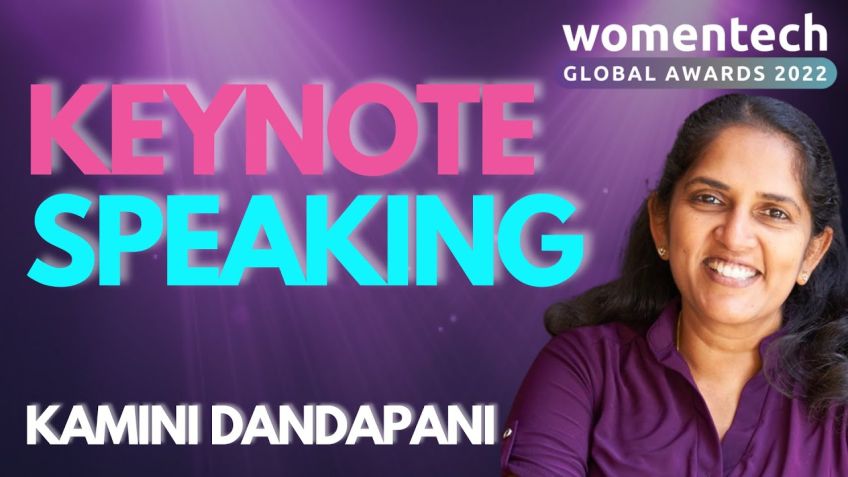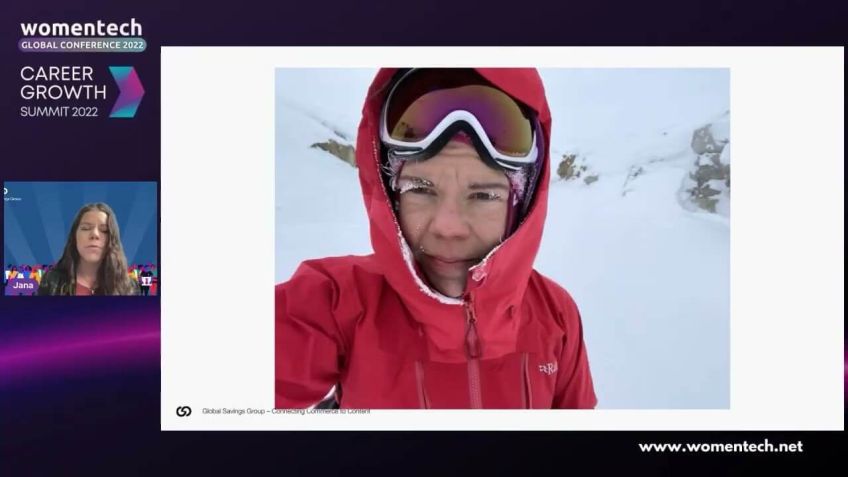From a non-tech background to a career in technology - My journey as a tech leader by Devshree Golecha
From Door to Door Sales to Vice President: The Inspiring Journey of De Shri Golec
Our latest speaker, De Shri Golec, is a textbook exemplar of the saying, “Your past does not define your future.” A former door-to-door salesperson in India, she successfully transitioned into being the Vice President of Data Analytics and Engineering at TDECU - all while hence as a housewife in the US.
But De Shri didn’t get to where she is today by chance. Her path was lined with persistence, hard work, and unshakeable faith in herself. Here, we delve into De Shri’s journey and her wisdom, gathered over a versatile and unique career path - full of challenges and triumphs.
A Career Shift that Defied All Odds
Despite being a “poor student” and struggling to pass tenth-grade math, De Shri Golec didn’t let academic failure deter her. She decided to pursue a Bachelor's in Business Administration, where she discovered a passion for finance. But even while climbing the ladder, she felt a strong pull towards technology.
De Shri is now incredibly honored to have been recognized by the Houston Business Journal and the CDC magazine in 2022, both as a 40 under 40 honoree and as one of leading academic data leaders in 2022. She was also celebrated as one of the Global Data Power Women by Chief Data Officer Magazine.
What pushed her forward? The belief that she could turn her “non-tech background into a career in technology.”
Moving from Sales to Data Analytics
De Shri’s career transition was inspired by her innate curiosity, desire to learn, and unyielding belief in herself. Being a ”field sales executive in India” exposed De Shri to the ins and outs of the banking industry, critical knowledge that would later benefit her role in tech.
Even when her English proficiency was under scrutiny, she didn’t let it stifle her progress. She decided to pursue her MBA and secured a job as a Process Engineer in the US. Despite the initial struggles, it was during this time she discovered her love and knack for advanced analytics. Her fascination led her to become a Six Sigma Master Black Belt, designed for those passionate about statistics – a far cry from her struggles with high school math.
This turning point for De Shri emphasizes that you should never let your past or others define your capabilities.
Making the Most of Adversities
Unforeseen complications in her life, such as delivering her first child and recovering from birth complications, did not deter De Shri from her journey. She found herself driving back and forth between Houston and San Antonio with her three-month-old baby to meet work commitments.
In her words, "You just have to keep going like there is no other way." De Shri’s story highlights the importance of resilience, determination, and seizing opportunities, regardless of their inherent challenges.
The Power of Self-Belief
In the end, one thing was constant throughout De Shri’s journey – her self-belief. She comforted herself with the knowledge that she was a “magical unicorn,” capable of achieving anything. All you need is to love yourself and “tell yourself how amazing you are.”
Her advice to those looking to make a career change or transition into tech is simple: “Don’t chase a million things. Chase that one thing a million times that you truly love.”
Conclusion
De Shri Golec’s journey reminds us of the infinite possibilities that await us when we decide to persist, learn, and believe in ourselves. Her path, full of obstacles and triumphs, is a testament to the importance of resilience, determination, hard work, and most importantly, unwavering self-belief.
Video Transcription
Um but I am very excited to announce one final speaker, De Shri Golec, she's the Vice president of Data Analytics and Engineering at TDECU. She started her journey from a door to door sales person in India, identifying as a housewife in the US after that.And then to the senior most data leader in one of the largest credit unions in the US. She has been recognized as the 40 under 40 honoree by the Houston Business Journal and the CDC magazine in 2022 as well and named one of leading academic data leaders in 2022 and one of the Global Data Power Women by Chief Data Officer Magazine. Um Her session right away is talking about having a non tech background and moving that into a career in technology. And so I know many of us here too might have come from that background or know people who have and so really encouraging and empowering women who may not have technical degrees but are building this career in technology. So without further ado Jesu, welcome to the stage. Hello.
Hi. Can you hear me?
You sound fantastic. Yes. So I will hand it right over to you as our last speaker of the Inspire Summit today.
OK. That's a lot of pressure. No, you're very, yeah. So, uh first of all, I do want to thank uh uh Anna for inviting. I really appreciate it and so much inspiration for her to found this amazing um organization, a platform that provides uh women an opportunity to, you know, uh sh share their um uh uh you know, their journey. And then most of all, I mean, we need women for women, right? And that's where I think Anna plays a very important role uh recognizing uh the achievements of uh of women, you know, across the, the tech industry. So, thank you so much. And kudos to you uh for doing that. Uh You know, I was thinking that um uh should I generally when, you know, I, I speak uh at any conference uh uh you know, whether in person or online, you know, have a slide deck and then I like to present. But I think this is like maybe for the first time where I thought that I'm not going to really share anything and I'm just going to keep it um uh natural.
And sometimes, you know, the best thing to do is to have a conversation and that's what I think I'm going to, to do today. Oh, so just a little bit about myself and, and my journey. So I was born and raised in India. Uh and, uh, uh, you know, I wasn't a really, uh, I, I wasn't into studies so I was a very poor student to even begin with. I can tell you that, uh, I was one of the backbenchers. So, uh, and then math and science were definitely not my thing. So I think in India, uh, I still remember, um, we had this, uh, you know, we had this subject called, uh, model Science and I used to do the best in that so I can at least take pride in that. But, uh, uh, but, you know, and then, uh, just fast forward, uh, I struggled, uh, with, with, with mathematics and I actually did fail my, my 10th, uh, you know, in 10th grade we have board, uh, exams in India and I did fail that. I still remember that. Um, so I think I was discouraged, uh, by my family and teachers and people around me to even think about, uh, taking, uh, an engineering, you know, degree or pursuing, uh, math or, you know, uh, science, uh, post that, post my high school.
So I think in my head, I thought that, you know, like how you're conditioned to think in a certain way when you are being told that. Oh, no, that's not your thing. Don't even think about it. Uh, so I actually took up, uh, uh, the, the Bachelor's in Business Administration. So that's, that's what I pursued and all with, all due respect. I really enjoyed it. Like a accounting and finance. It does require a lot of math. Um, then, uh, you know, after that, when I was, you know, uh, done with my, my bachelor's and I was wondering, like my undergrad degree. Like, what next for me? What am I? Because I think I was very clueless in my life at that time when I was back in India. Um, so I decided that I'm going to just start working, like I just do something like now you have done your undergrad, you need to do something. So interestingly, I studied finance in my undergrad. But again, I wasn't comfortable with the idea of numbers. I wasn't, I, I thought I wasn't there with that. So, you know, I just took up some sales jobs, uh, you know, uh, and then just started my journey with, with selling and then, you know, I used to work with, uh different banks and with, uh, you know, in India it's a little different, uh, than, uh, you know, how it works in the US.
And I still remember, uh, the, the beginning of my career, the hardship that I had to go through, uh, or to even, uh, you know, uh, to even like, make my basic living. Um, but at least I think one thing which I feel was good about me back then when I was 18 and, and even today when I don't, I don't think I need to share my, well, I'm 40 under 40 this year. So I'm less than 40 I can promise you. So, if back then, and even today, I think one thing which has always helped me is um being very hard working person. And I think I've always believed in myself. I, I just believe that I'm magical and I can do magic. You know, sometimes you just have to tell yourself you're, you are magical. You are the unicorn. And I always tell myself I'm the unicorn. Uh It doesn't matter, you don't need anybody else to tell you that you don't need that validation. It took me a long time to, except the fact that you don't need that, you know, external validation. You just got to love yourself and you just got to tell yourself how amazing you are. And, you know, I tell uh every morning, I tell myself uh I'm the queen and if you believe so you become one. So I'm just gonna tell you that.
But anyways going back uh to what I was sharing. So, yeah, uh uh then, you know, uh I worked for a few years uh in the banking and I tried to, you know, really work at the grassroot level. So I think I, I think what's important is laying your foundations very strong and that's what I focused on. I'm laying my foundations, very strong, learning how, you know, uh the, the banking industry works and what products and services they offer. So I really focused and I still remember that uh the, the, the bank that I used to work at, uh there wasn't really any c in for me because I was a field sales executive. So, um, don't compare that sales executive to the sales executive that you hear. You know, you hear about people here. My, uh my, you know, uh first job, full time job, my monthly salary was $50 a month. So uh you could imagine what I'm talking about. But what I was going to tell you is that I think my desire and passion to learn from others. I was always observing others. I was always, I had this hunger and desire to learn more and more either through listening, just observing others and, you know, just seeing what they are doing.
I, I think that really helped me uh uh uh you know, develop that kind of uh uh skill and that helped me with the industry knowledge because I was just following what I was just shadowing a lot of people. I would, I would see what the personal bankers were doing. I would see what the the branch managers were doing and what the teller is doing. I was just so curious that I would just observe all of them and learn and take inspiration from them and learn from them because I, I didn't know what I want to be in my life. So when you don't know what you want to be in your life, you just, just learn from different people. And at some point you figure out, ok, you know, maybe my wives are, are going in that direction and that is what I want to be. Uh one of the, the challenges that I had uh early when I was, you know, in my, my teen years and uh maybe early twenties was I think my difficulty with speaking English. So English is my third language and I did have a good English and I'm still, and if you feel my grammar is not right? So please please bear with me.
Um So I think uh and you know, my, I, so I think my communication was good because I think I was able to hold good communication with people, but my English was not in the right place. And I think when I used to work, I was always being told that, oh, no, your communication is poor. No, it's because I need to just improve my English. And then so again, you know how people condition you, they make you to think that you can do something because there's something lacking in, in you, but there's something lacking in everybody, right? We are all work in progress and I, I would hear that. Oh, no, you don't have an MB A, you're not going to grow. Uh So I realized maybe I need to, you know, uh take a break from my work and maybe pursue MB A and then, you know, I, I think that was one of the turning points in my life and I did, you know, uh, decided to pursue my MBA. I did it from one of the best business schools in India. Uh, fast forward and then I got married and moved to the US.
And, uh, interestingly when I came here, uh I was in a very complex situation and when I say that what I mean is I came on a dependent visa. So I pretty much could not uh work, right? I cannot earn because you're not really on a work visa. You're not a green card holder, not a citizen. Like what do you do? So uh had to do something, right? I put all that time in pursuing my MBA. I worked for about four years prior to coming to the US. So I had all that work experience. I had my degree. Now, what do I do with that? So, uh you know, when I came to the U si lived in Chicago for, so I would write to all these professors and all these universities and I would just write them emails after emails. And can I volunteer? Just can I volunteer as a research assistant? I, we didn't have the money for me to get a degree in the US. We, we didn't have that money. Uh Even if I were to like get a scholarship, but I didn't know if that would happen or, I mean, didn't have that confidence at that point because we were just starting our life here. So fortunately, uh one of the professors at the University of Chicago did give me um you know, uh a volunteer research assistant position.
And uh so I, you know, I started doing, uh I started working as a, as a volunteer researcher and I worked there for about 1.5 years at the University of Houston. I also worked for a risk management company again as a volunteer because I think sometimes we put too much emphasis into money and we forget about the learning and the foundations. I think it's so important in life to have your foundation strong uh to invest in yourself. And I feel money will follow. I think if we can uh and, and don't get me wrong when I say that. But I think sometimes people, especially the young people, they get so, so stuck with the idea of what my, my compensation is going to look like. I mean, I start my career at $50 a month and I'm fine. I'm doing really well for my life today. My point is that you need to worry less about how much I'm going to make when you're starting your career. But you need to worry more about and focus more into how I can add value, what I can learn, how I can be an expert at something that I become the guru person. And I think that's where my focus was. Uh uh I, so going back uh I worked as a research assistant. I was also doing uh you know, uh volunteer work at a risk management company. And then eventually I did apply for and then we decided to move to Houston because of my husband's job.
And then I applied for a phd program and then I got accepted. But the next thing I know, now I'm expecting my first child and I did have some complications. So I had to drop the idea of pursuing my phd. Uh So fortunately at that point, uh my work visa got sponsored and, and you know, when, when you ask for rain in your life, you got to be ready for month. So, yeah. Right. We all love rain, but we can't forget about the mud that the rain brings. So, uh I was expecting my first child and that's my only child and I had, and I'm so proud of her. Uh Now I had this complications in my pregnancy and then uh post uh my delivery, I was like completely bedridden for a few months. At the same time, my work visa got approved and my clock was ticking from an immigration standpoint so I could lose my work visa if I don't like join uh if I don't start working. So I delivered my daughter and I was extremely sick, uh, because of some complications. And my job, I lived in Houston and my job was in San Antonio. So imagine, uh, me taking a three month, three month old baby with me and driving every week back and forth from Houston to San Antonio because this was it, this is all I waited for like that, that job opportunity and I just could not let it go.
And it was tough. Like I lived in, in uh uh you know, we live in a hotel room with my baby and because our house, we bought a house which was in Houston and my husband had a full time job in Houston. So it was so kind of a complicated situation. So I still remember living in hotel rooms like different places with my baby and oh my gosh, like cooking inside that room. And for three years I kept doing that back and forth. Um, but I think it was worth it, that journey. If I think about it, it was worth it, that pain, that stress, it's all. I mean, I'm, I've never regretted it. You know, if I have to do it all over again, I will do it like many times because that made me a stronger woman that made me believe in myself. I like I learned many things. I learned how to drive. And the first thing I know I just started driving and I'm driving from here to San Antonio, right. So, yeah, uh driving with the baby and uh you know, uh with no driving experience at all. So there were, there were a lot of challenges uh with all that going on, I knew one thing which was very important is to continue to invest in myself. And which was I uh I started learning for a uh you know, six Sigma.
Uh And then I did my green belt certification, then I did my black belt certification and then I eventually became a six Sigma master black belt. And guess what, you know, all those people that at one point told me when I failed my uh my math uh when I failed in math in 10th grade that oh, math is not your thing. Numbers are not your thing. And guess what? That may me, that was the thing that made me uh you know, uh make my career in the US like the whole uh you know, statistics, the advanced analytics. Uh That's how I got into that space. Uh you know, starting from six Sigma. So no degree in the US just got excited about what you 16 Myers started studying. We had gotten that certification. Uh got a job as a process engineer. My first job in the US, my first paid job in the US. Um Then kept following that. I think uh one thing that really helped me in my life is uh I don't chase a million things, but I chased that one thing a million times, I think that's, I've always done that and I, I have never been after multiple things, but I've always spent, you know, multiple, uh you know, days and years into building that one thing where I feel, oh, I can be an expert at it.
Um And that's how I got into the advanced analytics and then, and then rest, you know, it just kept one after another. Now, one interesting thing that happened in my life was um uh teaching. Uh so I started teaching as an adjunct professor at the University of Houston. And guess what I was teaching, I was teaching uh uh quality improvement and statistics program. Can you imagine failing at math in 10th grade and teaching uh a stats program, one of the largest universities in the US. So anything can happen in your life, anything. No, I mean, you, uh if anybody comes and tells you that no, you can't do this or you can do that, you need to just take a deep breath and you need to empower yourself and you have to believe in yourself. Uh because your own self talk is more important than the talk you have with others, right? They don't, I think the only person that knows you the best is yourself. Nobody knows you better than yourself. You know what's, what works for you, you know. Uh It's like that, you know, when I eat black beans, I know it's gonna upset my tummy. It's, it's, it's just like that, you know, what works for you. So, my only, you know, uh, suggestion or advice or whatever you would say to all of you would be is, um, just, you know, believe in yourself. And I know you must have heard it and read it in several books. But actually it's, it's actually very true.
You just got to believe in yourself and I'm telling you every day is going to be different. Like today, you must be having the happy day tomorrow. It's going to be a crazy bad day. You're going to hate it, but you have to keep going like there is, there isn't really any other way like you just have to keep going. The yes you can, you can take breaks, take rest. There will be days when you don't want to do anything. Like just be your lazy self. It's OK but then stand back up again and then keep going. Don't stop yourself or anybody or um or, or you know, uh don't let any negative self, self talk effect. Uh uh You know how you, what do you want to be in your life? So yeah, just keep, keep shining and keep believing in yourself.
Thank you so much, Deb Sheen for wrapping up our day with such a great talk. You are such a clear communicator because I know I know you mentioned like your English at one point, but for us listening, your style of communication, your voice is perfect. So, kudos
to you, thank you.
And we're just, we're at the end of our day here. So I'm gonna sneak an extra minute with you. Um You have such a great story and kind of way of sharing with us. Is there anything um any kind of final advice that you would love to share with our audience today? Oh, and we're, we're seeing our final slide come up too. But um any any final kind of tips you, we're wrapping up the day we've seen all these amazing talks and you had such a good journey. But what, what are your final? I'm
going to, I'm just going to repeat that one thing that I said earlier um a few minutes ago that don't chase a million things, chase that one thing, million times that you truly love
so well said. Thank you so much for being with us here today. Um As part of our Women Tech Global Awards and community, we really appreciate you being here.
Thank you. Yes. OK. Bye bye. Yeah.

